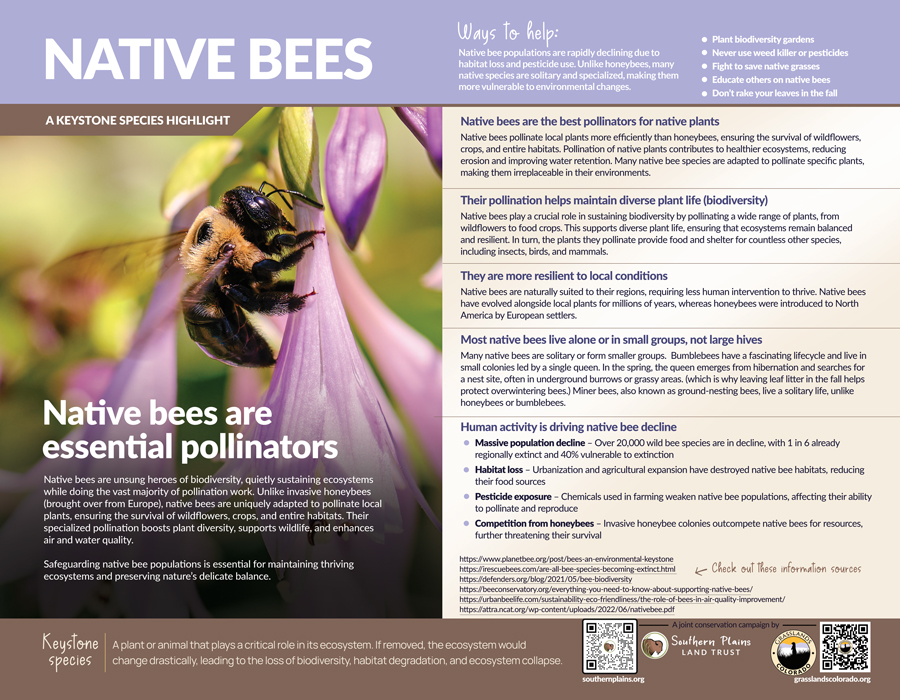
Native bees are essential pollinators
Native bees are unsung heroes of biodiversity, quietly sustaining ecosystems while doing the vast majority of pollination work. Unlike invasive honeybees (brought over from Europe), native bees are uniquely adapted to pollinate local plants, ensuring the survival of wildflowers, crops, and entire habitats. Their specialized pollination boosts plant diversity, supports wildlife, and enhances air and water quality. Safeguarding native bee populations is essential for maintaining thriving ecosystems and preserving nature’s delicate balance.
Native bees are the best pollinators for native plants
Native bees pollinate local plants more efficiently than honeybees, ensuring the survival of wildflowers, crops, and entire habitats. Pollination of native plants contributes to healthier ecosystems, reducing erosion and improving water retention. Many native bee species are adapted to pollinate specific plants, making them irreplaceable in their environments.
Their pollination helps maintain diverse plant life (biodiversity)
Native bees play a crucial role in sustaining biodiversity by pollinating a wide range of plants, from wildflowers to food crops. This supports diverse plant life, ensuring that ecosystems remain balanced and resilient. In turn, the plants they pollinate provide food and shelter for countless other species, including insects, birds, and mammals.
They are more resilient to local conditions
Native bees are naturally suited to their regions, requiring less human intervention to thrive. Native bees have evolved alongside local plants for millions of years, whereas honeybees were introduced to North America by European settlers.
Most native bees live alone or in small groups, not large hives
Many native bees are solitary or form smaller groups. Bumblebees have a fascinating lifecycle and live in small colonies led by a single queen. In the spring, the queen emerges from hibernation and searches for a nest site, often in underground burrows or grassy areas. (which is why leaving leaf litter in the fall helps protect overwintering bees.) Miner bees, also known as ground-nesting bees, live a solitary life, unlike honeybees or bumblebees.
Human activity is driving native bee decline
- Massive population decline – Over 20,000 wild bee species are in decline, with 1 in 6 already regionally extinct and 40% vulnerable to extinction
- Habitat loss – Urbanization and agricultural expansion have destroyed native bee habitats, reducing their food sources
- Pesticide exposure – Chemicals used in farming weaken native bee populations, affecting their ability to pollinate and reproduce
- Competition from honeybees – Invasive honeybee colonies outcompete native bees for resources, further threatening their survival
Ways to help:
Native bee populations are rapidly declining due to habitat loss and pesticide use. Unlike honeybees, many native species are solitary and specialized, making them more vulnerable to environmental changes.
- Plant biodiversity gardens
- Never use weed killer or pesticides
- Fight to save native grasses
- Educate others on native bees
- Don’t rake your leaves in the fall
Check out these information sources:
https://www.planetbee.org/post/bees-an-environmental-keystone
https://irescuebees.com/are-all-bee-species-becoming-extinct.html
https://defenders.org/blog/2021/05/bee-biodiversity
https://beeconservatory.org/everything-you-need-to-know-about-supporting-native-bees/
https://attra.ncat.org/wp-content/uploads/2022/06/nativebee.pdf
Keywords to use in Social posts:
#ColoradoWildlife #GrasslandsColorado #KeystoneSpecies #BeesMatter #Pollinators #BeesBeyondHoney #NativeBeesForBalance #HabitatConnectivity #ProtectWildCorridors #RewildColorado #RewildtheWest #BuzzForBiodiversity #NativeHabitat #LivingWithNativeBees #ColoradoPollinators #FrontRangeWildlife